
Democratic presidential candidate Julián Castro released a plan on Thursday focusing on assisting and bolstering the political power of indigenous communities. The former Housing and Urban Development secretary and San Antonio mayor is the first candidate in the 2020 primary to offer a comprehensive platform targeted at the needs of tribal and indigenous groups.
Castro’s “People First Indigenous Communities” plan addresses issues affecting these communities, including housing, health care, education, and voting rights. The plan also proposes ways for the federal government to better support tribal sovereignty, strengthening the independence and power of communities that have historically been harmed by policy and are disproportionately likely to deal with poverty and gender violence.
“Indigenous people have been continually subject to cruelty and neglect at the hands of the federal government,” Castro said in a July 25 Medium post. “We deserve a president who will strengthen tribal sovereignty, honor treaty commitments, ensure justice for Indigenous women, and advance tribal-federal partnerships for progress.”
Castro’s platform does not necessarily stand out for its uniqueness of ideas; many of the reforms called for in his plan have been demanded by indigenous activists for years. But what his platform lacks in originality, it makes up for in its scope. Released after his other policy rollouts that focus on issues disproportionately affecting communities of color, his new indigenous communities plan is the latest indication that Castro is centering his presidential run around uplifting the needs of marginalized groups often overlooked in policymaking.
Castro’s plan tries to address a range of disparities
Castro’s plan is broken down into five areas, each of which highlights a specific issue that his potential presidential administration would want to address:
- Tribal sovereignty
- Treaty commitments
- Indigenous women
- Democratic participation
- Partnering with indigenous communities
There’s a lot covered in the plan, but it generally functions as a mix of two approaches: addressing the needs of indigenous communities by supporting their increased sovereignty, and using federal power to close larger disparities in areas like housing, health care, and education that are disproportionately likely to affect indigenous communities.
To accomplish both, Castro calls for giving indigenous communities a stronger voice in Washington, saying that his administration would create a White House Council on Indigenous Communities, would resume holding the White House Tribal Nations Conference, and would also work to establish tribal advisory committees in every Cabinet-level agency by the end of 2024.
His plan also calls for increasing federal funding to several agencies, initiatives, and institutions, including a $3 billion a year investment in minority-serving institutions, a group that Castro notes also includes “Tribal Colleges and Universities and other Native American-serving institutions.” Castro also called for fully funding the struggling Indian Health Service, as well as making a $2.5 billion investment over a 10 year period to “ensure full funding” of the Indian Housing Block Grant program, the Indian Community Development Block Grant Program, and the Native Hawaiian Housing Block Grant Program, all of which are used to improve access to affordable housing for indigenous groups.
Castro adds that his administration would further support tribal sovereignty and protect indigenous cultures, calling for the passage of congressional bills like the Safeguard Tribal Objects of Patrimony Act and the Esther Martinez Native American Languages Programs Reauthorization Act, which are aimed at protecting tribal objects and cultural property, and promoting the education and preservation of Native languages, respectively. The candidate’s policy platform also argues that the US must also work to support indigenous rights in other countries, specifically suggesting that the US restructure its relationship with countries in Central America to include “assistance for marginalized Indigenous communities that face structural barriers to safety and opportunity.”
Castro also dedicates a section of his plan to addressing violence against indigenous women, who are more likely than other racial groups to experience domestic violence and sexual assault. Native communities have also grappled with a crisis of missing and murdered women, noting that the issue has been seriously underreported in federal data. Castro suggests that to address some of these issues, it is important to expand tribal sovereignty under the Violence Against Women Act, and create grants that would support tribal victims of crimes like domestic violence, sexual assault, and child abuse.
Castro’s campaign has focused on the needs of marginalized groups. His “People First Indigenous Communities” plan is the latest example.
On social media, Castro’s plan has attracted early praise, with observers noting that the plan calls attention to several issues and reforms that Native activists and policy groups have focused on for years.
Castro’s campaign says that this was intentional, adding that it reached out to activists, tribal governments, and experts when crafting the plan in an effort to ensure that the solutions suggested were actually the ones wanted by indigenous communities. He also notes that his commitment to working with indigenous communities dates back to his time working as HUD secretary during the Obama administration.
The plan is ultimately a continuation of how Castro has approached other “People First” policy rollouts in the first months of his campaign. He has largely focused on crafting policy proposals that would address specific issues that affect all Americans, but disproportionately impact marginalized communities — like access to fair housing, lead poisoning, and policing — and his policing plan in particular has been praised by activists and experts. He’s also used the beginning of his campaign to focus on visiting places that other presidential candidates didn’t, places like Puerto Rico and Flint, Michigan.
Despite this, Castro has struggled to climb above 1 to 2 percent in primary polls. But even as he fights to break out in a crowded field, his campaign is putting forward a clear vision of the issues and communities it wants to center, and the types of ambitious policies needed to help marginalized communities move forward in America. The positive reception to these proposals could push his primary opponents to do the same.
Sourse: vox.com






